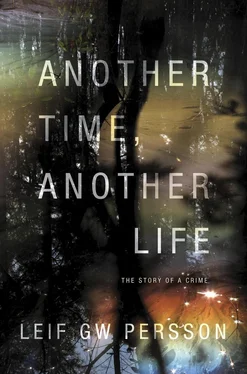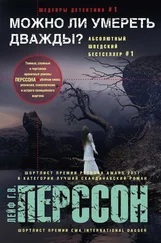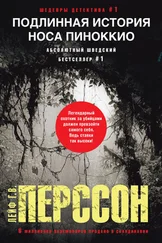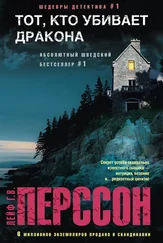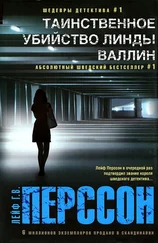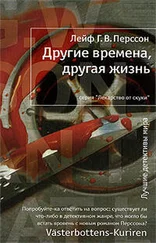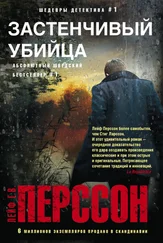“You don’t think that’s what this was really about then?” asked Johansson.
“What do you mean?” asked Berg.
“About information that might possibly come later,” said Johansson.
“You mean they wanted to open a doorway through which they might deliver someone other than Welander and Eriksson,” said Berg.
“Yes,” said Johansson. Like Stein, for example, he thought.
“The idea has certainly occurred to me, and I know who you’re thinking of,” said Berg, smiling weakly. “No,” he added, shaking his head to underscore what he said. “The information actually came from our own military intelligence service, and in the prevailing security climate I have a hard time believing they would conspire against their own undersecretary. I have a hard time seeing the motive, quite simply.”
So you have a hard time believing it, thought Johansson, but of course he didn’t say that. Instead he asked about something else, interesting in itself, related but at the same time far enough away if, like him, you preferred not to waken the bear that had gone into retirement, and would be dead soon anyway.
“According to one of my coworkers, the guy at the terrorist squad who received the tip got the impression that it came from the Germans and the SIRA archive,” said Johansson. “But that can’t be what happened, if I’m to believe you, since Welander had already made sure that he and his comrades were cleaned out of that archive in December 1989.”
“Yes, he must have had that all turned around. Personally I’m convinced that the military must have gotten the information from the Americans, and that it derives from Rosewood. There’s just no other possibility.”
“What I still don’t understand is why anyone took the trouble,” said Johansson. “Why in the name of heaven does someone tip us off about a matter almost twenty-five years old? About two individuals who are already dead and a preliminary investigation that will be null and void in six months?” What interest could the American intelligence service have in that? he thought, but of course he didn’t say it.
“As I just said, I’ve wondered about that, too,” said Berg. “I have no idea, actually, but it’s definitely a bit strange.”
“The only explanation, as I see it, is that they’re trying to build a doorway,” Johansson persisted. And that it’s about Stein, he thought.
“And that’s where we don’t agree,” said Berg, smiling weakly.
Not if I’m to believe what you’re saying, thought Johansson.
“Just one more thing,” said Johansson, looking at his watch. “Eriksson’s murder... do you have any idea who might have been behind that?”
“Not the faintest,” said Berg, “and to be honest I’ve really been trying not to get involved in what our colleagues in the open operation are up to. I’ve tried to take care of my business and let them take care of theirs, regardless of how good they’ve been at it. But since you’re asking, if only a fraction of what I’ve heard about Eriksson in connection with our operation is true, then the only mystery is why no one killed him sooner. The man seems to have been an exceptional little jerk. There must have been lots of people with different reasons for wanting to get him out of the way. But that it had anything to do with the West German embassy” — Berg shook his head — “that thought has actually never occurred to me.”
“So you don’t think his old comrades, Welander or Tischler, may have had anything to do with it?” asked Johansson, who did not seem to have heard what Berg had just said.
“I remember I discussed it with Persson when he was looking at the murder investigation on our behalf, and he was convinced that neither of them could have done it,” said Berg.
“Did anything about Eriksson emerge in connection with the surveillance of Welander and Tischler in December 1989?” asked Johansson.
“No,” said Berg. “He wasn’t even mentioned, which is interesting considering the timing — the man had just been murdered and Welander and Tischler would still have been his closest friends. We thought that was a little strange. Especially as Tischler seemed to spend half his time talking on the phone with more or less everybody about everything in the world and in the most astonishingly indiscreet way. It was as if the fellow... Eriksson, that is... had simply ceased to exist.”
“Then I won’t disturb you any longer,” said Johansson. What else do I say? he wondered. I have to say something, don’t I, because he’s dying.
“You take care of yourself, Erik,” said Johansson, looking seriously at his host. “And you shouldn’t worry about this, because I’m going to take care of it.”
“That’s nice to hear,” said Berg, and he looked as though he meant it.
Part 6
Another Time, Another Life
28
Friday, March 31, 2000
When Johansson arrived back at the office a package was awaiting him.
“You’ve got a package, Boss,” the guard in the reception area said, lifting up an ordinary brown grocery bag on the counter.
“Anything that’s ticking?” Johansson asked routinely.
“Just papers, but they were to be given to you personally, Boss,” said the guard.
“Are they from anyone I know?” said Johansson.
“Came by courier,” said the guard. “Seemed to be a nice guy. Looked like people mostly do.”
“But no one you recognized,” Johansson confirmed, smiling.
“No,” said the guard. “But he said they were worth reading. Then he wished you a nice weekend.”
“That was nice of him,” said Johansson, taking the bag.
In the brown paper grocery bag were two letter-size binders with investigation files from the seventies and eighties, and a large envelope that contained an old-fashioned audiotape of the kind SePo had already stopped using in the early eighties, as well as a one-page summary of the essentials of the Swedish involvement in the occupation of the West German embassy almost twenty-five years ago.
Persson, thought Johansson as he sat leaning back comfortably behind his large desk, no matter that the brief, typewritten summary was unsigned. It was both explanatory and edifying, and although it was accompanied by several hundred pages of investigation materials and a number of tape-recorded conversations, the essentials were clear to Johansson within an hour. Besides, on the audiotapes he had heard the voice of innocence, with its distinctive tone, in two conversations captured on different occasions, and this was not overly common at his place of employment, and especially not when it came to conversations monitored by the secret police.
The first conversation was from early May 1975. A confused, furious, and very young Helena Stein calls Sten Welander at his office at the university, screaming that he had duped and betrayed her, calling him a murderer and a traitor, and threatening to go to the police and report herself, him, and all the others. The latter, by the way, seems to disturb him considerably more than do her moral condemnations of him. He seems most discomposed that she could be “so fucking dense” as to call him on his phone. When he can’t get her to be quiet he finally hangs up, and when she immediately calls back again, no one answers.
The second conversation took place more than three years later, in the autumn of 1978, at a better restaurant in Stockholm. The law school graduate Helena Stein, who has just turned twenty, reads the riot act to Theo Tischler, eleven years her senior. She gives vent to her well-controlled and well-articulated wrath, and a very remorseful Theo Tischler simply cowers and takes it. Considering the secret police’s persistent denials that they had ever been involved in concealed electronic eavesdropping, the high technical quality of the recording is both astonishing and admirable.
Читать дальше
